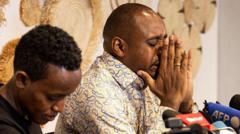In a surprising move, Guinea's military government has pardoned Moussa Dadis Camara, the former military ruler sentenced for his role in a 2009 stadium massacre that claimed over 150 lives and left numerous women assaulted. The pardon, attributed to health concerns, raises questions about justice for the victims as the state prepares to compensate them.
Former Guinea Ruler Pardoned Amid Controversy Over Stadium Massacre

Former Guinea Ruler Pardoned Amid Controversy Over Stadium Massacre
Guinea's ruling junta has granted a controversial pardon to ex-military leader Moussa Dadis Camara, who was serving a 20-year sentence linked to a tragic massacre.
Moussa Dadis Camara, the ex-ruler of Guinea, was released from a 20-year sentence due to health issues, less than a year into his term. Camara's conviction stemmed from the horrifying events of September 2009, when troops under his command violently suppressed a rally demanding a return to democracy, leading to widespread bloodshed and suffering.
On state television, a decree announced his pardon, a move that follows the ruling junta's recent commitment to provide compensation to the massacre's victims. The victims' reparations were detailed by Justice Info, with payouts varying from $173,000 for rape victims to compensation for death, disappearance, looting, and torture.
Camara had initially seized power amidst the political upheaval following the death of long-time President Lansana Conté, and his reign soon became notorious for its brutality. After an assassination attempt led him to flee Guinea, he returned in 2022, asserting his innocence during a lengthy trial that resulted in convictions for him and seven military commanders.
In the aftermath of his pardon, the reaction among his family and supporters has been jubilant, with his brother expressing gratitude towards the current president. Meanwhile, questions remain about Camara's health and the larger implications of this decision on the pursuit of justice in Guinea as the country navigates its history of military rule and civil unrest.



















